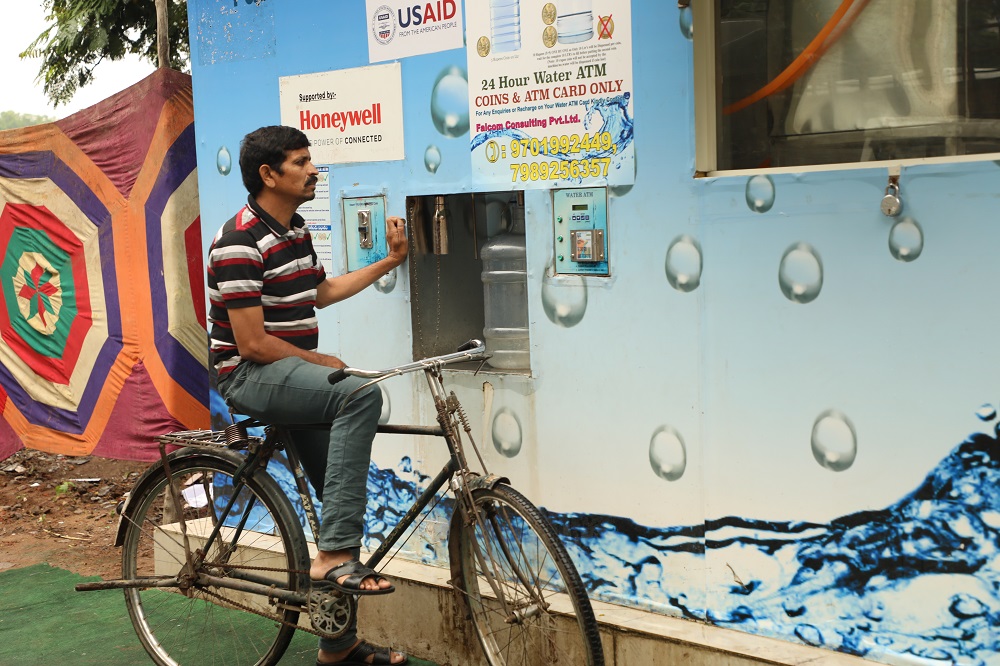
USAID and Honeywell support the initiative to strengthen safe water access.
While everyone is busy scrambling for groceries and other essentials, the international community is increasingly recognizing the dire need for clean water. We’re being told to regularly wash our hands and pay attention to our hygiene, but what happens when clean water doesn’t make its way into our homes? If we are to beat Covid-19, communities, especially those beyond the pipe, must have access to safe water. This is where Small Water Enterprises (SWEs) continue to step in and play an important part in bridging this gap. In order to not only deal with the current pandemic but also provide water security on an ongoing basis, the Small Water Enterprise Alliance (SWE Alliance) has launched the Sustainable Enterprises for Water and Health (SEWAH) program with the support of USAID and Honeywell to help strengthen urban water access in India. SWEs are the right choice for drinking water security during Climate Change, for building resilient cities, and for reduction of water borne disease.
More than 163 million people in India lack access to clean water, with a staggering 65.5 million of those living in urban slums. 21 of India’s major cities already face ground water depletion, putting 100 million lives and livelihoods under threat. With a projection of 68 cities in India proliferating to over 1 million inhabitants by 2030, the current water crisis will only be further exacerbated. Inadequate access to safe water affects livelihoods and income generation, school attendance, and puts an excessive load on public healthcare systems. That system is even more stretched during any epidemic outbreak, let alone a pandemic.
“We aim to create City Water Alliances as a platform to bring all stakeholders in the city to converge on addressing this issue,” says Poonam Sewak, VP of Safe Water Network India and one of the key functionaries behind the SEWAH project. “With our three pronged approach — bringing about policy coherence, leveraging the strength of the SWE Alliance members and widely disseminating the best practices – we hope to alter the landscape of the urban water situation.” The aim of the initiative is to collectively promote safe water access for all through last mile connectivity, delivering 24/7 safe drinking water through social entrepreneurship in low income urban, peri-urban areas, and documenting and disseminating the best practices for improving public health and creating resilient cities.
City Water Alliances established under this program will bring together city municipal officers, water supply and health department officials, NGOs, SWE implementers, concerned citizens, corporates, and those already working on water issues. Each of the selected cities, such as Gurugram, Hyderabad, Nagpur, Faridabad, Warangal to name a few, will have a group of concerned stakeholders working with the system, galvanizing resources and support to build the water resilience. The Ministry of Housing & Urban Affairs is a champion of the project and supporting the efforts at every level.
“There is a sharp focus on women and gender empowerment in this effort,” Poonam added, saying, “It comes as no surprise that women are disproportionately affected and burdened with responsibilities related to water, which include collection, treatment, and domestic chores.” The SEWAH program aims to increase the role of women through participation and operation of water enterprises. Empowering women through workforce development and entrepreneurship will in turn provide financial independence and improve the health and livelihoods and those of their households.
“Rolling out the SEWAH program in select 20 cities is an important step in realizing scale and reaching other parts of the country,” said Kurt Soderlund, CEO of Safe Water Network. He also added, “To do that, the team will build strategic partnerships, disseminate best practices through workshops, peer to peer dialogues, roundtables, national and international conferences, study tours, water festivals, and social media”. The public is encouraged to participate and provide creative ideas on how to best serve their cities.
The entire world is challenged by the Covid-19 pandemic. While we’re putting out this fire, we must build robust systems for water and public health so we are better prepared. The aim of the SEWAH program is to put the systems, mechanisms, and public ownership in place to do this.
READ MORE:
Robert De Niro, Anupam Kher and Norah Jones headline Safe Water Network’s ‘Water for All Ball’ (October 26, 2019)
Safe Water Network calls for collaborative effort to tackle water problem (October 27, 2018)
Why clean water matters to young girls? (September 10, 2019 )
Equipping leaders with tools for today’s complex world (January 30, 2020)



